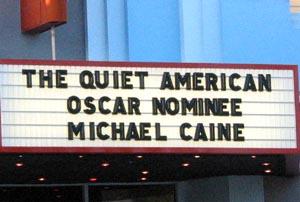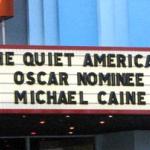The Quiet Vietnamese
"The weak overcomes the unbending,
And the submissive overcomes the strong,
This everyone in the world knows
yet no one can put it into practice." -- Tao Te Ching
One can be forgiven for looking forward to the new film version of The Quiet American, based on Graham Greene's prophetic and controversial novel of the same name. Billed as the first Hollywood film about the Vietnam War to be shot in post-war Vietnam -- rather than in one of Vietnam's pro-American neighbors -- it could be expected to portray more faithfully the book's anti-American outbursts than did its 1958 predecessor, which Greene deemed "incoherent" and a "real piece of political dishonesty". American focus groups gave the new version a pre-release thumbs-up. But when September 11th happened, the film was shelved pending the return of America's willingness to criticize itself. Finally released last year, the film had meanwhile become popular in Vietnam.
Covering the French portion of the war, the film lacks the now customarily dismal, "Black Hawk Downer" combat; and its Americans are all spooks, part of the "Economic Aid Mission" front for the CIA. But for all the resulting prominence of the Vietnamese characters, they are all rather flat and even sinister. In this respect The Quiet American is standard Hollywood schlock and a betrayal of Greene: his Vietnamese may have been flat, but no Greene character is ever sinister.
The film opens with the face of Phuong -- the Vietnamese lover of British journalist Thomas Fowler -- juxtaposed with explosions. The overlay is Orwellian. Phuong looks inscrutable, even threatening; one can imagine a hostile audience throwing tomatoes at her. This is Hollywood Orientalism circa 1958. Her sister, who has undertaken the potentially lucrative task of marrying Phuong off to foreign money, is grim. Almost never do the Vietnamese express the joy that is part of daily life in Southeast Asia. Instead Vietnam is portrayed as a mystifying abyss that swallows frail or gullible men. Greene's love for it does not come through.
Nor does his anti-Americanism. Fowler complains about the "noisy bastards" down at the Hotel Continental; he glowers at the boorish and boozy American journalist Granger, who is more pitiable than annoying. Perhaps this is a matter of physiognomy: Granger is all pudge and pucker and sweat. And the film includes the scene in which Granger, sobbing, informs Fowler that his son is afflicted with polio. The director cuts back and forth from this scene to the desperate, futile, slow motion efforts of the Quiet American Alden Pyle to escape his several assassins. This climactic scene is one of the film's most poignant, even more so than the civilian massacre that Pyle had helped organize.
And because this scene is the more poignant, the audience is likely to sympathize with Pyle and not with Fowler, who is portrayed as an old, selfish, deceitful layabout. That he also drinks whisky, smokes opium, and admits to past promiscuity would make him the epitome of depravity to an American audience. (Predictably, many American reviewers have affixed the damning label "opium addict" to Fowler, simply because he, like Greene, experimented with opium.) But clean-cut Pyle shuns whisky, scoffs at opium, and smokes one cigarette only to intensify his lecture to Fowler concerning America's civilizing mission. (The offices of the Economic Aid Mission should, for the sake of historical accuracy, be smoke-filled; they are not.)
Greene's novel asked whether actions based on good intentions are necessarily moral. And I think Fowler answered in the negative: "Innocence is like a dumb leper who has lost his bell, wandering the world, meaning no harm." "I never knew a man who had better motives for all the trouble he caused." Fowler is sorry for having assisted Pyle's assassination, but Pyle is barely sorry for having killed Vietnamese: rather than tend to their wounds, he wipes their blood from his polished shoe. But in the film we feel sorry for Pyle, whose heart was in the right place and whose death is agonizing to watch; toward Fowler we feel, at best, ambivalence.
But the film successfully shows how all foreigners in Vietnam were ultimately at the mercy of their supposed subjects and distressed damsels. Pyle wants to rescue or "protect" the dancer-for-hire Phuong from exploitation, much as he wants to rescue or protect Vietnam from Communism. Both goals are as noble as they are foolish: as Fowler tells Pyle, Ho Chi Minh would have won any truly democratic election. Fowler is content to use Phuong and Vietnam for his own happiness; his motives are cynical but more realistic (he uses Phuong's body; she uses his money and holds out for a ticket to London.) Phuong is more upset by the news of Pyle's death in the film than in the book; but in both she manages to move on. Like her country, she sticks with the winning side; and in a way she is the film's only truly admirable character.
Early reviews of The Quiet American predicted that Michael Caine's performance as Fowler was Oscar-worthy, and he was indeed nominated. But there is only one scene in which he inspires awe. Having learned that Pyle is importing plastic explosives to arm the so-called Third Force led by the erratic General The, Fowler barges into the Economic Aid Mission and makes a tragic fool of himself by swinging his cane about and howling a summons to Pyle. He then collapses into a bathroom stall and weeps over this gross and very un-British loss of self-possession.
Although Caine is sometimes inspired, Brendan Fraser as Pyle is even more so, and has been more credibly cast. The novel's Fowler is older than Pyle, but he is probably not as old as Caine. We root for Pyle in the film in part because the Fowler-Phuong pairing is so unnatural as to be almost obscene: that such pairings are quite common in Southeast Asia does not make them any less repellent. The novel's Fowler is disenchanted and "degage"; but he's still more lively and combative than Caine. But Fraser, the adventure hero of The Mummy and the versatile goofball of Bedazzled, is a natural for Pyle. He is courageous and physically strong but gauche and emotionally fragile. He follows Caine around like a puppy, and he adopts a laughable stray dog named, of all things, "Duke". One could easily imagine him dispensing chocolate bars to liberated French children, or repeatedly saying the word "Shucks".
The novel's Fowler teases Pyle relentlessly; he describes him as "young and ignorant and silly". But in the film Fowler seems to realize that this is a façade, as when he learns that Pyle, whose spoken French is atrocious, can not only speak Vietnamese fluently but uses this fluency to bark orders at the unruly natives. Pyle does appear young and silly when, wearing nerdy spectacles, he reverently reads a book called Dangers to Democracy; but when he reveals his true identity to Fowler he appears only young and serious -- too serious, as it turns out, for Vietnam's farcical civil war. His determination kills him, not his naiveté. Certainly he makes the mistake of trusting Fowler. But this is not as important as the retribution he receives for the massacre, indisputably a terrorist act. Fowler is only karma's instrument; Pyle was doomed anyway.
For what it's worth, the Thai with whom I saw the film in Bangkok also felt sorry for Pyle and angry at Fowler. Revealingly, I think, she was not particularly bothered by the political massacre (Thailand's most recent was in 1992) and she believed with Pyle that it might serve some higher purpose. She praised Pyle's practicality, industry, and simplicity over Fowler's sanctimony, lassitude, and deviousness; and she believed that Phuong would have been better served by the strapping and romantic American, who moreover -- according to the film -- has "assets". But she was critical of the meek Phuong; she has seen too many like her in Thailand: women who do nothing but wait for a white knight to save them from their unfavorable circumstances.
But from Greene's novel one gets the impression that Phuong is less helpless than she is in the film, in which she has recently graduated from common prostitution. For insofar as Fowler is Greene -- and I think he is much more than Greene would admit -- Greene would have been giving himself little credit in wishing to marry a whore whose sister happens to be ambitious, however disillusioned both Greene and Fowler might have been with married life back in England. One wonders what the Vietnamese thought of the film. They might have been flattered that it was not just about Americans. They might have been cheered by the fact that Phuong alone of the main characters emerges both innocent and alive. But I can imagine them being disappointed by the exaggeration of Pyle's death throes. And the film concludes with a series of Thomas Fowler's newspaper articles, detailing America's pitiless submersion into Vietnam, itself robbed once again of a starring role in its own drama.
* * * * *
Review of The Quiet American, directed by Phillip Noyce.
* * * * *
 ThingsAsian
ThingsAsian

















